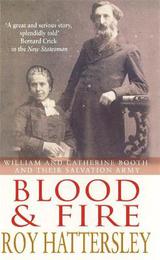
|
Blood and Fire: William and Catherine Booth and the Salvation Army
Paperback / softback
Main Details
| Title |
Blood and Fire: William and Catherine Booth and the Salvation Army
|
| Authors and Contributors |
By (author) Roy Hattersley
|
| Physical Properties |
| Format:Paperback / softback | | Pages:480 | | Dimensions(mm): Height 198,Width 127 |
|
| Category/Genre | Biographies and autobiography |
|---|
| ISBN/Barcode |
9780349112817
|
| Classifications | Dewey:287.960922 |
|---|
| Audience | |
|---|
| Illustrations |
Section: 16, B&W
|
|
Publishing Details |
| Publisher |
Little, Brown Book Group
|
| Imprint |
Abacus
|
| Publication Date |
5 October 2000 |
| Publication Country |
United Kingdom
|
Description
An uneducated youth, William Booth left home in 1849 at the age of 20 to preach the gospel for the New Methodist Connection. Six years later he founded a new religious movement which succeeded to such a degree that the Salvation Army (which it became) is now a worldwide operation with massive membership. In many ways Booth's story is also that of the Victorian poor, as he and his wife Catherine made it their lives' work to battle against the poverty and deprivation which were endemic in the mid- to late-1800s. Indeed, it was Catherine who, although a chronic invalid, inspired the Army's social policy and attitude to female authority. Her campaign against child prostitution resulted in the age of consent being raised and it was Catherine who, dying of cancer, encouraged William to clear the slums. Roy Hattersley's dual biography is not just the story of two fascinating lives but a portrait of this integral part of British history.
Author Biography
Lord Hattersley of Sparkbrook was a Labour MP for over thirty years, and served in each of Harold Wilson's governments as well as Jim Callaghan's Cabinet before becoming deputy leader of the Labour Party in 1983. He is now an award-winning journalist and author.
Reviews'A great and serious story, splendidly told ... A fine and evocative double biography' NEW STATESMAN 'A serious and lively tome ... Hattersley describes both these remarkable people with skill and affection' SUNDAY TELEGRAPH 'A splendid book ... BLOOD AND FIRE is packed with good things... Hattersley is a superb guide to both the personalities of the Salvation Army and its social significance. So absorbing in his narrative that one can actually imagine oneself as a late 19th-century salvationist fighting the good fight against a sea of troubles.' SUNDAY TIMES 'This sympathetic but revealing biography gives the Booths their place in the pantheon of great Victorians.' THE TIMES 'The multifaceted Roy Hattersley produced a superb combination of biography and social history.' GLASGOW HERALD 'A broad-minded, sympathetic and eminently humorous biography of a pair of earnest prigs whose unselfconscious absurdity has unfairly obscured their radical and lasting achievement.' CATHOLIC HERALD '[A] magnificently readable story...a stylish, minutely-researched book which opens the lid on a fascinating and intriguing and, until now, rarely touched upon aspect of Victorian life.' IRISH NEWS 'BLOOD AND FIRE is elegantly written and its tone is finely poised, combining amazed admiration for the Booths' guts and energy with a wry willingness to documen their foibles.' GUARDIAN 'An informative record of the Booths' extraordinary achievement in creating their evangelical Army.' INDEPENDENT 'William Booth's extraordinary life saw him starting out as a pawnbroker's clerk and dying having created one of the most successful and characteristic religious movements of the age. His wife Catherine was, in her way, even more remarkable: chronically ill--"throughout her life she was struck down with disease after disease that would have killed a less hardy and indomitable woman"--she nonetheless raised eight children in 10 years and campaigned powerfully for social amelioration. It was in large part because of her campaign against child prostitution that the age of consent was raised from 13 to 16. Roy Hattersley doesn't shrink from criticising Booth, who was "both arrogant and autocratic in his relations with everyone except his wife" but at the same time he is patently enamoured of the sheer energy Booth brought to his sense of mission. It doesn't surprise us that a socialist such as Hattersley is attracted to this dedication: "In an age when even radicals believed that self-help solved all problems", he says, Booth knew that some people were oppressed "by the circumstances in which they were born and lived", a doctrine that "owed more to Marx than to Methodism". But other aspects of Booth's Army seem more New Labour--the fact that he was, in Hattersley's words, "the greatest publicist of his age" or his affable hob-nobbing with the rich and famous ("he was no class warrior, he never used his sermons to denounce the callous rich"). Hattersley's perspective is more focused on these issues of class and his account of the campaigns for social amelioration is absorbing. The underlying religious questions are less thoroughly interrogated, though; it is difficult, for example, to determine Hattersley's attitudes to what amounts to the religious fundamentalism of the Salvation Army's core beliefs. Contemporaries worried that Booth's methods were too "music hall", "intellectually absurd", "theologically indefensible" and--perhaps worst of all in respectable, middle-class Victorian England--"deeply embarrassing." Like a television Evangelist today, Booth has his problematic side. But Hattersley carries the whole thing off with the expertise we have come to expect of him.' Adam Roberts, AMAZON.CO.UK REVIEW
|